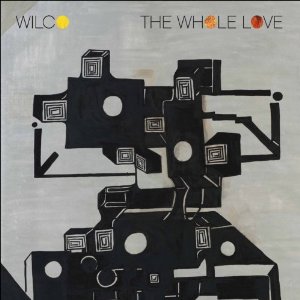There was a feature on Flavorwire recently about The 10 Things That Are Killing Music, and one of its more salient comments was that, “It’d really be lovely if everyone’d stop trying so hard to be what they’re supposed to be, and just be themselves.” Wilco, it would be fair to say, have reached that point. They are arguably one of the few acts that have almost always followed their own inclinations, and – like Radiohead, with whom they are increasingly compared – seem willing, perhaps even impatient, to test themselves with each new release, exploring new territory while maintaining their own distinct personality.
Curiously, however, The Whole Love is the sound of a band existing very much within their comfort zone. The risks that they have taken on previous releases are largely absent here, instead replaced by a confident belief that they can operate within the constraints of simple, classic songwriting. Sure, there are shortlived moments of eccentricity: church bells intruding on the fade at the end of ‘One Sunday Morning (Song for Jane Smiley’s Boyfriend)”s 12 minutes of gentle meandering; ‘Art Of Almost”s misleading opening minute, which suggests they’re about to embark upon an album that will mirror Radiohead’s electronica-influenced diversions. But mainly The Whole Love does very little to draw attention to itself beyond offering an hour of immaculately constructed songs, performed with a quiet assurance and free of ostentatious frills. This, one suspects, is Wilco just being themselves.
So, after its opening curveball, ‘Art of Almost’ kicks off the album with a notable but humble swagger, Tweedy’s distinctively strained voice set amidst a growing backdrop of restless drums and a keyboard tic that recedes to make way for a motorik instrumental coda ripped open at its conclusion by one of Nels Cline’s fierce guitar solos. It’s one of the genuinely few moments during which the album seems to shake off a sense of restraint, though ‘Born Alone’ is a crowd-pleasing of Television-infused indie rock, and recent single ‘I Might’ sounds like Elvis Costello and The Attractions given an American makeover, something one might also suggest of ‘Standing O’. ‘Dawned on Me’, meanwhile, bizarrely recalls Supergrass’s ‘Alright’ in its melody, though the arrangement seems to have been reinforced by a passing Robert Fripp on his way to Bowie’s 1970s Berlin sessions, and ‘Sunloathe’ might have nestled comfortably on George Harrison’s ‘All Things Must Pass’. Elsewhere, ‘Open Mind’ and ‘Rising Red Lung’ showcase Tweedy’s tender side, and ‘Black Moon’ sees them return to their Americana roots, its pedal steel and acoustic guitars cushioned by understated strings.
Unfortunately, ‘Capitol City’ dips a little too far into the playful, though its lyrical comparison between the grit of the city and the peace of the countryside is pleasantly nostalgic, but perhaps the biggest complaint one could make against the record is how remarkably unassuming it is. This initially means that, after the first twenty minutes or so, it drifts by, with even the title track shuffling along in a low-key fashion before slipping away in a quiet blur of backwards guitars. But, inevitably, repeated plays reveal that the songs are full of tiny details, and with familiarity comes a recognition of the genuine craftsmanship that’s gone into each track. Nowhere is this more evident than on the lengthy closer, the aforementioned ‘One Sunday Morning (Song for Jane Smiley’s Boyfriend)’, which features Tweedy singing in a low, almost whispered voice against a sparse construction of fingerpicked guitar and piano flourishes that sounds remarkably like Lambchop. Though it threatens at its end to break into a stoned, reach-for-the-stars climax, it exercises the same command characteristic of the album as a whole, content to allow the introspective atmosphere to prevail, conclusive proof that Wilco feel no need to play to the gallery.
The Whole Love is, therefore, just another Wilco album. But it’s Wilco at the top of their game, or at least close to it, patrolling territory they’ve made their own and secure in the knowledge that they belong there. It’s the sound of a band comfortable with the idea that they, rather than the marketplace, define the way they make their music. It’s a privileged situation to be in, no doubt helped by their bank accounts, and stems – one suspects, or at least hopes – from a powerful belief that creating music of durability is at least as important as lining their wallets still further. It doesn’t make them the American Radiohead, however. It’s just Wilco, being Wilco, and that, it turns out, is exactly who they’re supposed to be.


